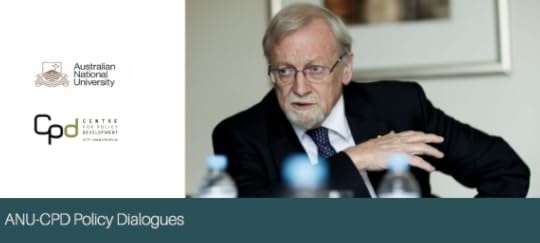Centre for Policy Development's Blog, page 34
June 5, 2017
Invitation to Directors’ Duties and Climate Risks Business Panel | June 8 | Sydney
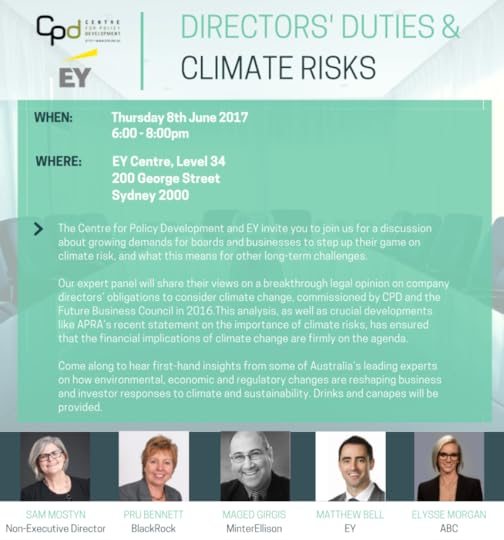

The post Invitation to Directors’ Duties and Climate Risks Business Panel | June 8 | Sydney appeared first on CPD.
Event: Directors’ Duties and Climate Risks Business Panel | June 8 | Sydney


The post Event: Directors’ Duties and Climate Risks Business Panel | June 8 | Sydney appeared first on CPD.
May 18, 2017
Join CPD Fellow Ian Dunlop and call for more urgent climate action now
 For almost two decades, CPD Fellow Ian Dunlop has been a powerful voice advocating for both a better understanding of climate science as well as for more urgent, robust policy responses from government. His expertise and policy work have been recognised at home and abroad.
For almost two decades, CPD Fellow Ian Dunlop has been a powerful voice advocating for both a better understanding of climate science as well as for more urgent, robust policy responses from government. His expertise and policy work have been recognised at home and abroad.
In May 2015, Ian was part of the first Rome Symposium on Climate Change, an initiative of the Nobel Prize winner Michail Gorbachev, Fondazione Italiani and the New Policy Forum. It provided advice to the Vatican prior to its release of the Pope’s Encyclical, “Laudato Si”. This became a highly influential statement helping to create a consensus for action ahead of COP21 in Paris.
The Rome Symposium convened for a second time this May, attended by 20 experts from all over the world under the direction of Martin Lees, former secretary general of the Club of Rome and delegate to United Nations COP conferences.
The experts examined the rigor of the climate science and discussed what future decarbonisation strategies should look like across the world. They also published a declaration asking for international support for better policies tackling this most pernicious challenge.
Their overall advice is clear, ‘The future of humanity is at stake. We need transformational change now’. You can read their full statement about the urgency of climate change here, and sign to show your support.
You can also read the latest op-ed from Ian, on the long-term effects of the Adani coal mine in Queensland.

The post Join CPD Fellow Ian Dunlop and call for more urgent climate action now appeared first on CPD.
April 19, 2017
Roundtable on Australia’s Climate Security | U.S. Expert on Climate Change and National Security
On April 7, the Centre for Policy Development, together with the Melbourne Sustainable Society Institute at the University of Melbourne (MSSI), delivered a roundtable on climate security with special guest Dr Sherri Goodman, a leading global expert on this subject and one of the interviewees for CPD’s 2015 report The Longest Conflict. Dr Goodman was joined by Cheryl Durrant, Director of Preparedness at the Australian Department of Defence (ADF) as well as Rob Sturrock, CPD Policy Director and lead author of The Longest Conflict.
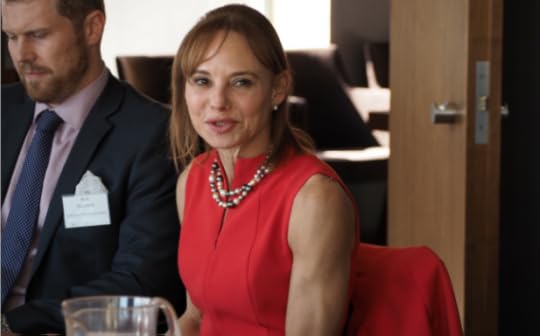
Climate change and national security
Climate change has ramifications for all aspects of our lives, yet the security impacts remain largely undiscussed in Australia. This is despite the fact that climate security has risen to prominence globally in the past decade. Events such as natural disasters, extreme weather, rising sea levels and resource shortages pose a direct threat to countries around the world. Yet climate change also interacts with pre-existing problems within societies. Climate-driven phenomena such as declining natural resources, reduced crop yields, rising food prices and increased morbidity can act as accelerants for instability and conflict.
Australia – which finds itself in the region most exposed and vulnerable to climate change – lacks a rigorous, fulsome policy dealing with our climate security challenges at home and abroad.
It was within this context that Dr Sherri Goodman came to Australia to discuss climate security and to improve awareness of the issue. Dr Goodman is a former US Deputy Undersecretary of Defence for Environmental Security, a life member of the Council of Foreign Relations and key contributor to a series of landmark US reports on climate security by the non-profit research body CNA. She was in Australia to help promote the award- winning documentary The Age of Consequences which focuses on the security impacts of climate change.
Our experts discussed how thinking on these issues has evolved in Australia, the U.S. and globally:
Sherri Goodman provided an overview of the key points from The Age of Consequences, as well as insight into how the debate has evolved in the U.S. and globally since the early 2000s. Sherri also reflected on her engagements in Australia over the week.
Rob Sturrock gave an appraisal of Australia’s efforts on climate security in recent years, including how the issue was framed in the 2016 Defence White Paper, and what policy responses the country requires.
Cheryl Durrant provided an update from the Department of Defence on how it is undertaking climate preparedness and ensuring that the Australian Defence Force is ready for a new operating environment in the future.
This was followed by a wide-ranging discussion with a diverse and expert audience. Participants included: Cath Smith (HESTA), Damon Gameau (Filmmaker), Dr Helen Szoke (Oxfam), Gemma Henderson (The Boston Consulting Group), Ian Dunlop (CPD), James Bentley (NAB), Joanne Saleeba (HESTA), John Brenan (Hamer Family Fund), John Wiseman (Melbourne Sustainable Society Insitute), Kelly O’Shanassy (Australian Conservation Foundation), Luke Taylor (Breakthrough), Peter Khalil (Member of Parliament), Sam Hurley (CPD), Sarah Barker (MinterEllison), Sarah Brenan (Hamer Family Fund), Stephanie Campbell (Melbourne Sustainable Society Insitute), Sue Mathews (Mullum Trust), Vanessa Petrie (Beyond Zero Emissions), Susie Byers (Lead Organiser Political and Community Campaigning, CPSU), Steve Skala (Vice Chair, Deutsche Bank), Terry Moran (CPD), Tim Baxter (Melbourne Law School).
Media coverage
Sherri’s Australian visit received significant press coverage, which helped highlight the importance of the issue. For a sense of what was discussed during the week, we encourage you to look at any of the following material:
Australia Is Sleepwalking Into A Climate Security Nightmare, Rob Sturrock, Huffington Post
Climate threatens Australia’s security in unexpected ways, Sherri Goodman, The Canberra Times
‘Disaster alley’: Australia could be set to receive new wave of climate refugees, Ben Doherty, The Guardian
US military taking climate change into account in food and energy security, Laura Tingle, The Australian Financial Review
Is the US military at odds with Trump administration over climate policy?, Fran Kelly, ABC’s RN Breakfast

The post Roundtable on Australia’s Climate Security | U.S. Expert on Climate Change and National Security appeared first on CPD.
April 13, 2017
1st ANU-CPD POLICY DIALOGUE ’17 | Australian Foreign Policy White Paper – challenges and opportunities | April 2017
This year CPD is excited to partner with the Australian National University (ANU) for a new event series. Co-hosted by the two institutions, the ANU-CPD Policy Dialogues are a series of high-level conversations on some of Australia’s key policy issues. The dialogues are an opportunity for fresh thinking on Australia’s policy processes and strategies. They enable a wider variety of voices (business, professional and philanthropic community leaders) to contribute to a conversation on how to tackle the long-term opportunities and challenges facing Australia. On April 12, CPD was proud to co-host the first event in the series, focussing on Australian foreign policy.
ANU-CPD Policy Dialogues: Gareth Evans in conversation with Allan Gyngell
2017 Australian Foreign Policy White Paper – challenges and opportunities
The Australian Government has committed to releasing a new Foreign Policy White Paper this year, its first since 2003. Developing a new framework to guide our international engagement is a critical task, as Australia encounters a geopolitical environment more challenging than any period since the end of the Cold War. The past twelve months have demonstrated that Australia can no longer take for granted the continuity of advantageous international conditions. If Australia could previously deal with the world as she found it, she must now deal with the world strategically with a view to shaping it, particularly in our region.
How should Australia chart its course in international relations over the next decade? Do we need more strategic capability to understand developments beyond Australia and how best to respond? How can we ensure foreign policy thinking is integrated across government and embedded in Australian society?
These questions were at the heart of the first ANU-CPD Policy Dialogue for 2017. The interactive discussion commenced with ANU Chancellor and former Foreign Minister, the Hon Gareth Evans AC QC, in conversation with Allan Gyngell AO, former diplomat, foreign policy adviser to Prime Minister Paul Keating and Director-General of the Office of National Assessments.
Key points of the discussion
Needless to say, G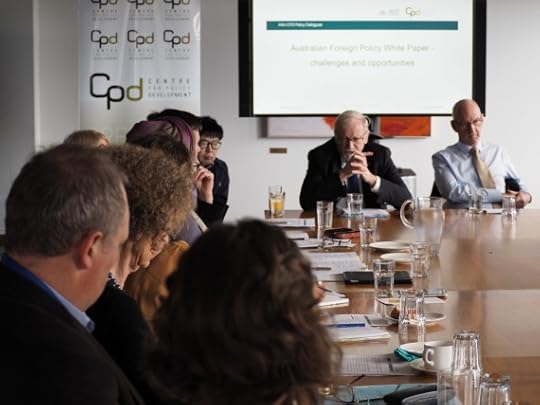 areth and Allan have a unique vantage points and perspectives on foreign policy, the significance of particular bilateral and institutional relationships, and Australia’s history and impact as a regional and global player.
areth and Allan have a unique vantage points and perspectives on foreign policy, the significance of particular bilateral and institutional relationships, and Australia’s history and impact as a regional and global player.
In his remarks, Gareth Evans emphasised the importance of clearly articulated national interests in guiding effective foreign policy, and argued that these included not only economic and strategic interests but also values-based interests. Successful and sustainable foreign policy requires a strategic and conceptual approach, instead of a reactive approach. He argued that Australia’s foreign policy should be less reflexive in its support for decisions taken in Washington DC, while reiterating our commitment to democratic and human rights values in our relationships in our region.
Allan Gyngell provided an overview of his newly-published book Fear of Abandonment – a review of the history of Australian foreign policy since the second world war. He said that the questions and dilemmas Australian foreign policy makers face today are more difficult than they have been in many decades. However, Australia had a rich history of contributing to and shaping the region and the world, and today’s policymakers must seize key opportunities for Australia to protect the global rules and institutions that matter – especially in a world where we can’t rely on others to do this for us.
This was followed by a wide ranging-discussion with a diverse and expert audience. Participants included: Daniel Flitton (The Age), Denise Cauchi (CEO, Diaspora Action Australia), Dewi Wahab (Indonesian Consul-General, Melbourne), Harrison Young (Director, CBA), Helen Evans (Associate Professor, Nossal Institute for Global Health), Jenny McGregor (CEO, Asialink), Leanne Smith (Associate Director, Whitlam Institute), Michael Rowland (ABC News), Paul Ronalds (CEO, Save the Children), Peter Binks (CEO, BHERT), Peter Mares (Writer and broadcaster), Rachel Ball (Head of Public Policy and Advocacy, Oxfam), Terry Moran (Chair, CPD) ,Martine Letts (CEO, Committee for Melbourne), Sam Byfield (Strategic Planning and Engagement, Victorian Department of Health), Sam Hurley (Policy Director, CPD), Susie Byers (Lead Organiser Political and Community Campaigning, CPSU), Victor Perton (Leadership Adviser and Advocate, Australian Leadership), Steve Skala (Vice Chair, Deutsche Bank), Yassmin Abdel-Magied (Engineer, author and broadcaster) and Travers McLeod (CEO, CPD).
Key points of the discussion included:
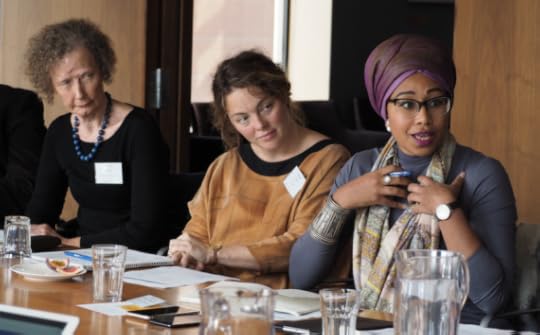
The importance of Australia having a better sense of its national identity, to give it more clarity and self-confidence as an international actor.
The need for Australia’s conception of its national interests to reflect the voices and views of a wide range of people in an increasingly diverse and multicultural modern Australian society, not outdated views from our past, or ingrained ideas from a narrow subset of the community.
Australia’s great and unique opportunity to use the soft-power links of its multicultural society more strategically.
CPD would like to thank Gareth, Allan and the team at ANU House for hosting the event, and participants who contributed to an engaging and expert start to the ANU-CPD Policy Dialogue Series.
You can read a piece from the ABC’s Michael Rowland, who participated in the discussion, here: http://www.abc.net.au/news/2017-04-13/gareth-evans-blasts-donald-trump-urges-pivot-to-asia/8441444.
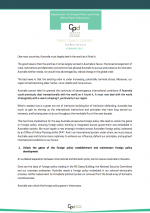 Background – CPD’s submission to Foreign Policy White Paper
Background – CPD’s submission to Foreign Policy White Paper In February, CPD made a submission to the Foreign Policy White Paper process. We made three recommendations:
(1) that policymakers in Canberra “unlock the gates of foreign policy” by involving more domestic constituencies in the policy-making process;
(2) that DFAT boost its strategic policy capability by invest in an Office of Policy Planning; and
(3) that Australia strive for “smart institutionalism”, including a bolder vision for multilateral diplomacy that “connects each institutional engagement to a larger coherent strategy.”
The audience for this event reflected the first of these themes, in that it included both foreign policy experts and other leaders from business, civil society and community organisations with a wider interest in foreign policy.
Key documents and media coverage
“Trump ‘acting on posture, not policies’, says former Australian foreign minister Gareth Evans“, Michael Rowland, ABC News
Submission to Australian Foreign Policy White Paper, CPD

The post 1st ANU-CPD POLICY DIALOGUE ’17 | Australian Foreign Policy White Paper – challenges and opportunities | April 2017 appeared first on CPD.
March 30, 2017
Fourth meeting | ASIA DIALOGUE ON FORCED MIGRATION | March 2017
The fourth Asia Dialogue on Forced Migration meeting took place in March 2017. Download key documents below and read on for more about the meeting, including photos.
Key documents for the fourth ADFM meeting:
Full agenda and participant list
Briefing papers
Participant profiles
Press Release
Further information:
For the ADFM home page click here.
To find out more about the rationale behind the ADFM click here.
To read more about the first ADFM meeting in Melbourne in August 2015 click here.
To read more about the second ADFM meeting in Bangkok in January 2016 click here.
To read more about the third ADFM meeting in Kuala Lumpur in September 2016 click here.
The fourth meeting of the Asia Dialogue on Forced Migration (ADFM) was held in Jakarta on 5-7 March 2017.
The ADFM meeting was hosted by the Research Centre for Politics, Indonesian Institute of Sciences (LIPI) with support from the Ministry of Foreign Affairs Indonesia.
The ADFM expanded its membership, deepened its policy contributions to the Bali Process on People Smuggling, Trafficking in Persons and Related Transnational Crime (Bali Process) and developed its connection to the Association of South East Asian Nations (ASEAN) at its meeting in Jakarta. We again demonstrated the great value of regularly bringing together experts from across the region to take stock, share information and compare ideas on forced migration.
We successfully reached out to a broader set of stakeholders and enjoyed strengthened participation from regional governments. New members joining the discussions in their personal capacities included Leocadio Trovela (Philippines Senior Representative, ASEAN Senior Officials Meeting on Transnational Crime), Ashraf Haidari (Director General of Policy and Strategy, Ministry of Foreign Affairs Afghanistan), Patawee Treekarunasawad (Counselor and Chief of the Humanitarian Section, Social Division, Ministry of Foreign Affairs Thailand), Chomboon Phansrisak (Plan and Policy Analyst, Office of the National Security Council Thailand) and Wanchai Roujanavoung (Senior Consultant Prosecutor, Office of the Attorney-General Thailand).
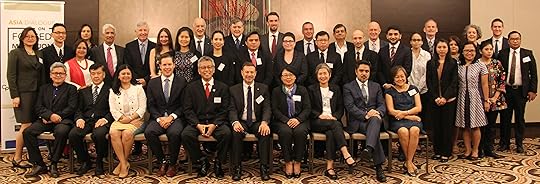
Non-government and private sector representation was also strong, with new participants from the University of Dhaka, Bangladesh, The Star, Malaysia, Corrs Chambers Westgarth and Qantas. Chris Evans, former Australian Senator now working with the Global Freedom Network, also joined us to discuss private sector action on forced migration issues.
At the ADFM Dinner, kindly hosted by the Ministry of Foreign Affairs Indonesia, Former Foreign Ministers Hassan Wirajuda of Indonesia and Stephen Smith of Australia advised the group on the strategic questions facing the region and the importance of second track diplomacy.
Discussion and resolutions
The strong momentum of the ADFM continues with members accomplishing significant outcomes together in Jakarta.
The ADFM accepted the Bali Process’s request to provide ongoing policy advice to its member countries. Ministers and senior officials are building the capability of the Bali Process to lead and stimulate real improvement in the region’s responses to forced migration. ADFM members are grateful to be able to contribute to that evolution and are proposing to focus in the first instance on further developing the emergency response mechanism for mass displacement.
The ADFM’s central theme in Jakarta was trafficking in persons, forced labour and slavery, which continue to be a major challenge for the region and acutely relevant to the movement of vulnerable people. Despite significant gains in the national and regional policy and legal frameworks, progress in prevention, protection and prosecution is slow and uneven, with only a small fraction of victims being identified and assisted. ADFM members considered two case studies – the Benjina case of trafficked fishermen and the case of Bangladeshi trafficking victims from areas affected by climate change. Together, these exemplify emerging patterns and challenges in trafficking, forced labour and slavery in the Asia-Pacific.

More public attention, resources and political focus are now directed to these issues than ever before and there are consequently new opportunities for engagement and change. ADFM members offered to act as a knowledge partner to the newly announced Bali Process Government and Business Forum – which will bring together government and business leaders to discuss responses to trafficking, forced labour and slavery within business operations and supply chains – and recommended key priorities for the forum to focus on.
We agreed recommendations to the ASEAN Senior Officials Meeting on Transnational Crime (SOMTC) to advance the implementation of the ASEAN Convention Against Trafficking in Persons, Especially Women and Children (ACTIP). The ADFM are ready to work with ASEAN to strengthen the implementation mechanism, cross-sectoral collaboration and the sharing of good practices.
Members enjoyed a frank exchange on the evolving global and regional context of forced migration. We explored developments since the Refugee and Migration Summits in New York in September 2016, as well as the implications for the Asia-Pacific region of the hardening positions of the U.S. and Europe on forced migration issues.
ADFM members agreed that there was clear opportunity for the ADFM to contribute to the negotiation of the Global Compacts on migration and refugees. The region’s focus could be on sharing what we have learned about managing forced migration issues and advocating for approaches that will be workable for our region. Useful contributions may be on: the development of migration governance and coordination; responses to trafficking in persons; labour migration and mobility; and safe, orderly and legal migration pathways.
We agreed a tight set of forward priorities, including continuing and new initiatives. The ADFM will next meet in September 2017 and March 2018.
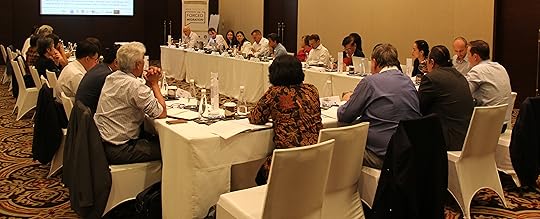

The post Fourth meeting | ASIA DIALOGUE ON FORCED MIGRATION | March 2017 appeared first on CPD.
February 21, 2017
Public panel on climate risk and directors’ duties
Last Thursday in Melbourne, we co-hosted a booked-out public event on the directors’ duties work with the Future Business Council. The event featured CPD’s Sam Hurley as well as Bryan Horrigan, Angela Emslie and Sarah Barker – each of whom participated in our high-level business roundtable on this topic late last year. The discussion was moderated by business commentator Alan Kohler.
The panel discussed the implications of a breakthrough legal analysis commissioned by the Centre for Policy Development and the Future Business Council in 2016 on directors duties’ and climate risk. The legal opinion was authored by leading barrister Noel Hutley SC with instruction from MinterEllison.
We used this opportunity to take our work on climate and directors’ duties to a wider audience. The conversation reiterated the legal opinion’s findings that company directors are permitted (indeed required) to take climate change into account, and said the opinion would have a major positive impact on how climate-related risks and opportunities are approached in corporate boardrooms. Its implications were covered in depth by ABC TV’s The Business earlier this week.
Panelists
 Alan Kohler has been a financial journalist for 46 years. He is the publisher of the Constant Investor, business editor at large at the Australian, well-recognised finance presenter on the ABC news and presenter of the Talking Business channel on Qantas inflight radio.
Alan Kohler has been a financial journalist for 46 years. He is the publisher of the Constant Investor, business editor at large at the Australian, well-recognised finance presenter on the ABC news and presenter of the Talking Business channel on Qantas inflight radio.
 Sarah Barker has twenty years experience advising Australian/multi-national clients on governance, compliance, misleading disclosure and competition law issues. Sarah is currently a non-executive director of the $24-billion Emergency Services & State Super, the Responsible Investment Association Australasia, and of NRCL Ltd. She was the instructing solicitor on the Hutley opinion and is a leading Australian expert on this area of the law.
Sarah Barker has twenty years experience advising Australian/multi-national clients on governance, compliance, misleading disclosure and competition law issues. Sarah is currently a non-executive director of the $24-billion Emergency Services & State Super, the Responsible Investment Association Australasia, and of NRCL Ltd. She was the instructing solicitor on the Hutley opinion and is a leading Australian expert on this area of the law.
 Professor Bryan Horrigan became Dean of the Faculty of Law at Monash University in early January 2013. Bryan has extensive experience in both academic and professional fields in public and corporate law and governance from Australian, transnational, and cross- disciplinary perspectives. Mr. Horrigan is an accomplished author and leader in the area of corporate responsibility.
Professor Bryan Horrigan became Dean of the Faculty of Law at Monash University in early January 2013. Bryan has extensive experience in both academic and professional fields in public and corporate law and governance from Australian, transnational, and cross- disciplinary perspectives. Mr. Horrigan is an accomplished author and leader in the area of corporate responsibility.
 Angela Emslie as a previous Director of CareSuper, Vision Super, VicSuper, and AusFund, has extensive experience as a professional Trustee Director having served on a range of industry fund and related boards for almost 20 years. Ms. Emslie has extensive strategic, governance and investment related skills and is regarded as a prominent thought-leader in the industry.
Angela Emslie as a previous Director of CareSuper, Vision Super, VicSuper, and AusFund, has extensive experience as a professional Trustee Director having served on a range of industry fund and related boards for almost 20 years. Ms. Emslie has extensive strategic, governance and investment related skills and is regarded as a prominent thought-leader in the industry.
Related reading:
Alan Kohler on coal and climate change.
Australias Financial System and Climate Risk: Discussion Paper, The Climate Institute
‘Paris Agreement a watershed moment for corporate Australia‘ Adele Ferguson, Australian Financial Review
‘Business leaders heed warning on climate change risks‘ Damon Kitney, The Australian
‘Company directors to face penalties for ignoring climate‘ Jessica Irvine, The Age/SMH
‘Directors ignore climate risks at their own peril‘ Bryan Horrigan, Australian Financial Review
Directors personal liability for corporate inaction on climate change - Sarah Barker, 2015

The post Public panel on climate risk and directors’ duties appeared first on CPD.
February 19, 2017
Settling Better: Reforming refugee employment and settlement services | REPORT | February 2017
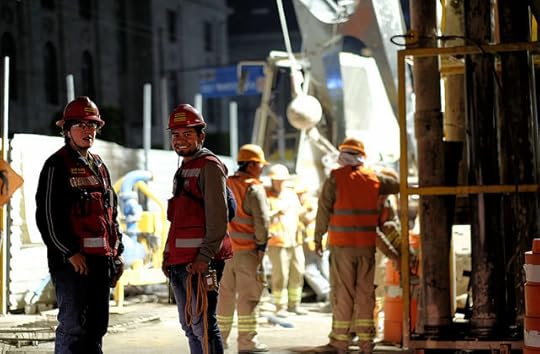
As a nation built on immigration, humanitarian migrants (refugees and others in refugee-like situations) make up only a small proportion of the entrants who settle in Australia. Over time, however, these refugees have made an enormous contribution to the nation. Ensuring their successful integration has been vital to building a prosperous, welcoming and proudly multicultural Australia.
The bipartisan commitment supporting refugee resettlement is the strongest affirmation of Australia’s global citizenship. The Australian Government is determined to ensure that people settling in Australia have the help they need to rebuild their lives and become fully functioning members of the community. There is overwhelming evidence that employment provides the bedrock for successful settlement. The best way to help humanitarian migrants to build flourishing lives is to help them find work.
But how effective are Australia’s settlement services with respect to employment? Are we drawing on our full potential to ensure the best economic, social and civic contributions of refugees to our society with the employment and settlement services currently in place?
CPD latest report, Settling Better: Reforming refugee employment and settlement services, takes a look at these questions. Written by CPD Research Associate Henry Sherrell and prepared with the support of the Boston Consulting Group, Settling Better calls for a new approach to refugee employment and settlement services. This is the first time the Building a New Life in Australia longitudinal research survey data has been analysed publicly.
The genesis of this report was an August 2016 roundtable co-hosted by the Centre for Policy Development and the Centre for Public Impact, a BCG Foundation. The roundtable featured insights from experts and policy makers from Australia, Canada, the United States and Germany on settlement services and labour market integration for refugees. We are grateful to all those who participated, many of whom have since provided feedback on this report.
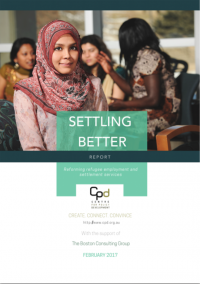
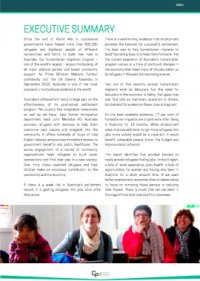
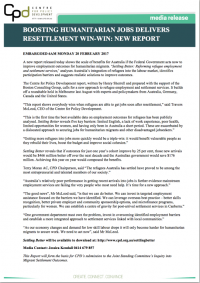
Full report
Executive summary and foreword
Media release
KEY FINDINGS
The weak link in Australia’s settlement record is getting refugees into jobs soon after they arrive.
Getting more refugees into jobs faster would be a triple-win for Australia: it would benefit vulnerable people, boost the budget and improve social cohesion.
Analysis of the latest data reveals five primary barriers to newly arrived refugees finding jobs: limited English, a lack of work experience, poor health, a lack of opportunities for women and having only been in Australia for a short amount time.
Even a modest improvement in employment outcomes would generate major fiscal benefit for government – reinforced, of course, by the broader benefits to social capital and cohesion and to migrants themselves.
Reducing the participation, income and unemployment gap by 25 per cent between just one annual quota of refugees and the average person in the labour market will create $465 million worth of income for refugees and their families and is worth $175 million to the Australian Government’s budget bottom line over the next decade.
We must act now as the economy changes and demand for low skill labour drops. There is much we can learn from promising practices overseas, including in skills recognition, private and community sponsorship and microfinance.

POLICY RECOMMENDATIONS
INVEST IN EFFECTIVE AUSTRALIAN PROGRAMS TO OVERCOME EMPLOYMENT BARRIERS, THROUGH:
Providing specialised and intensive case management for humanitarian migrants that integrates initial settlement services, English language programs and employment; and
Renewed investment in existing programs built on a more accurate evidence base.
LEVERAGING OVERSEAS BEST PRACTICE, BY:
Enhancing private and community sponsorship within the humanitarian program;
Introducing trial programs for faster recognition of humanitarian migrants’ existing skills; and
Developing microfinance options that could be of particular benefit to women and their families.
ESTABLISHING A CENTRE OF GRAVITY FOR SETTLEMENT SERVICES, BY
Centralising post-arrival humanitarian and settlement policy within the Department of Social Services; and
Formalising government priorities in an updated National Settlement Framework.
EXECUTIVE SUMMARY
Since the end of World War II, successive governments have helped more than 800,000 refugees and displaced people of different nationalities and faiths to build new lives in Australia. Our humanitarian migration program –one of the world’s largest – enjoys the backing of all major political parties and broad community support. As Prime Minister Malcolm Turnbull confidently told the UN General Assembly in September 2016, ‘Australia is one of the most successful multicultural societies in the world’.
Australia’s achievement rests in large part on the effectiveness of its post-arrival settlement program. ‘No country has integrated newcomers as well as we have,’ says former immigration department head John Menadue AO. Australia provides refugees with services to help them overcome past trauma and integrate into the community. It offers hundreds of hours of free English classes and provides immediate access to government benefits and public healthcare. The active engagement of a myriad of community organisations helps refugees to build social connections and find their way in a new society. Over time, these resettled refugees and their children make an enormous contribution to the community and the economy.
If there is a weak link in Australia’s settlement record, it is getting refugees into jobs soon after they arrive.
There is overwhelming evidence that employment provides the bedrock for successful settlement. The best way to help humanitarian migrants to build flourishing lives is to help them find work. Yet the current expansion of Australia’s humanitarian program comes at a time of profound changes in the economy that mean many of the jobs taken up by refugees in the past are becoming scarcer.
Two out of five recently arrived humanitarian migrants work as labourers, but the need for labourers in the economy is falling. Refugees may also find jobs as machinery operators or drivers, but demand for workers in these roles is stagnant.
On the best available evidence, 17 per cent of humanitarian migrants are in paid work after being in Australia for 18 months. While employment rates improve with time, to get more refugees into jobs more quickly would be a triple-win: it would benefit vulnerable people, boost the budget and improve social cohesion.
This report identifies five principal barriers to newly arrived refugees finding jobs: limited English, a lack of work experience, poor health, a lack of opportunities for women and having only been in Australia for a short amount time. If we want better employment outcomes then it makes sense to focus on removing these barriers or reducing their impact. There is much that we can learn in this regard from best practice from overseas.
There is plenty of evidence that settling humanitarian migrants better will have substantial payoffs. Statistics show that refugees are more entrepreneurial than other migrants and that over time they can catch up with others in the job market. But there is potential to accelerate their entry into work to the benefit of all.
If the labour market outcomes for just one year’s intake of humanitarian migrants improved by 25 per cent, then over the subsequent decade those new arrivals would be $466 million better off and the Australian government would bank $176 million in budget savings.
To achieve this outcome year on year would compound the benefits, producing additional income for humanitarian migrants of close to $2.5 billion and a gain of almost $1 billion for government revenue over the subsequent decade.
The rewards from this growing dividend are far more than financial. Expanding employment opportunities for refugees is central to successful integration. Better job outcomes will strengthen social cohesion and help reduce alienation and extremism – not just amongst refugees, but also amongst those established members of the Australian community who might fear or resent the presence of newcomers.
If Australia is to remain a leader in refugee resettlement then we must adapt in the face of change. Political leadership and investment must nurture the public legitimacy that forms the bedrock of the humanitarian program. This report charts the path forward. It explains how our proposed three-pronged approach can improve settlement services, build social cohesion and prosperity, and sustain confidence in Australia’s humanitarian program as one of the world’s best.
MEDIA COVERAGE AND OTHER READING
Media
We’ve lost the knack of finding jobs for refugees, The Australian, Terry Moran and Larry Kamener.
AMP, Harvey Norman, Woolworths and Telstra back refugee jobs plan, Australian Financial Review, Laura Tingle.
Refugee settlement government has ‘no centre of gravity’, The Mandarin, David Donaldson
Related reading:
A Significant Contribution: The Economic, Social and Civic Contributions of First and Second Generation Humanitarian Entrants, Department of Immigration and Citizenship, 2011.
Building a New Life in Australia: The Longitudinal Study of Humanitarian Migrants, Department of Social Services, 2015.
Endorsement of Paris Aristotle, CEO of Foundation House, Victorian of the Year and Chair of the Settlement Services Advisory Council
The most comprehensive study of refugee settlement in Australia, by Graeme Hugo and others, concluded that “the overwhelming picture when one takes the longer term perspective of changes over the working lifetime of (humanitarian) settlers and their children is one of considerable achievement and contribution.” That is certainly the view of Foundation House, which has assisted thousands of refugee settlers, from many countries, over several decades.
Australia’s outstanding record of settling refugees must be attributed primarily to the personal qualities of people who have survived awful experiences, and also to the services this country has put in place to assist them. In 2104, former UN High Commissioner for Refugees Antonio Gutteres said Australia has “the most successful resettlement program I can imagine…”
But we can and must do better, in particular to help refugees find employment more speedily than is currently the situation.
As this very timely report states, such an outcome would be “triple-win: it would benefit vulnerable people, boost the budget and improve social cohesion.”
Achieving this demands a robust analysis of the barriers facing those able and keen to work and new ideas to overcome them, to be examined closely and trialled.
Settling Better provides both and will provide a welcome focus for informed discussion among policy-makers and settlement agencies.
I look forward to participating in that process.
The post Settling Better: Reforming refugee employment and settlement services | REPORT | February 2017 appeared first on CPD.
February 16, 2017
APRA lays down a marker on climate change risks in the financial sector
Today Australia’s prudential regulator has laid down an important marker on climate-related risks and their impact on the financial sector. This new statement from the Australian Prudential Regulatory Authority came in a speech on 17 February by APRA Executive Board Member Geoff Summerhayes to the Insurance Council of Australia’s Annual Forum. This provides a crystal-clear indication that the company-level and systemic impacts of climate change are now attracting increased scrutiny from Australia’s financial regulators and policymakers, as they are around the world.
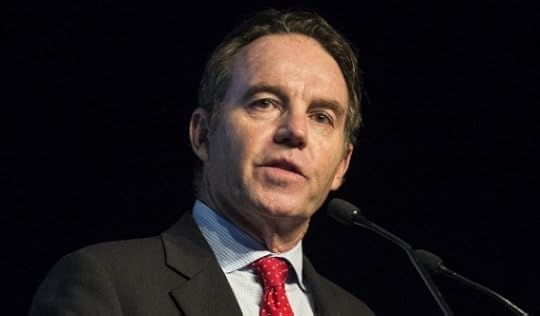
Mr. Summerhayes’ speech emphasises the immediate and directly financial nature of many climate-related risks and says that these risks are now firmly on the horizon for Australian financial sector entities and the prudential regulator.
“While climate risks have been broadly recognised, they have often been seen as a future problem or a non-financial problem. […] This is no longer the case. Some climate risks are distinctly ‘financial’ in nature. Many of these risks are foreseeable, material and actionable now.”
The speech, entitled ‘Australia’s new horizon: climate change challenges and prudential risk’ is the first of its kind by a leading Australian regulator. According to Mr. Summerhayes, his remarks are “absolutely consistent with the approach that is being taken overseas”.
Leading global regulators including the Bank of England, the Financial Stability Board and others have been at pains to emphasise both the physical risks associated with climate change (which include the direct business impacts of a changing climate) and the transition risks that stem from a complex adjustment to changes in technology, policy and economic structure as we transition to a low-carbon future. Today’s speech reiterates that approach and highlights the importance of predictable, effective policy responses to meet emissions reductions commitments, noting that policy uncertainties, delays, and reversals make transition risks larger and more difficult to deal with.
Mr. Summerhayes made clear that APRA expects regulated financial-sector entities like insurers and banks to consider the impact of climate-related risks on their business.
“A comprehensive understanding that will help to identify and avert potential vulnerabilities is not possible unless entities and regulators are systematically monitoring, disclosing and talking about these risks.”
APRA’s statement follows significant developments in the second half of 2016, including the entry into force of the Paris Climate Agreement and the Financial Stability Board’s recommendations on climate-related risk disclosure. Today’s speech is another crucial step in the Australian context, providing the clear regulatory guidance and leadership on the financial impacts of climate change that many market participants have been calling for.
Another major development, and one cited in Mr. Summerhayes’ speech, was the release last year of a new legal opinion commissioned by CPD and the Future Business Council on directors’ duties and climate change. The opinion demonstrates that directors who fail to consider the impact of foreseeable climate change risks on their business properly could be held personally liable for breaching the duty of due care and diligence they owe to their companies. Last October, we co-hosted a high-level roundtable to discuss the implications of the opinion with 30 representatives from the regulatory, corporate, superannuation and legal communities – including Mr. Summerhayes. In today’s remarks, he said that “in this and other discussions, I have detected a broad appetite for regulators and firms to get much better at this now that the horizon for Australia is in sharp focus”. Today’s clear guidance from APRA on the importance of climate risk, and clarity on legal obligations of company directors to consider the financial impacts of climate change, mean that this issue will be firmly on the agenda for company directors and investors.
Key documents and media coverage
Earlier CPD work on this issue:
Roundtable on directors duties, climate risk and sustainability
Legal opinion on directors duties and climate risk
Company directors can be held legally liable for ignoring the risks from climate change‘ Sam Hurley, Travers McLeod and John Wiseman, The Conversation
Related reading:
Australias Financial System and Climate Risk: Discussion Paper, The Climate Institute
‘Paris Agreement a watershed moment for corporate Australia‘ Adele Ferguson, Australian Financial Review
‘Business leaders heed warning on climate change risks‘ Damon Kitney, The Australian
‘Company directors to face penalties for ignoring climate‘ Jessica Irvine, The Age/SMH
‘Directors ignore climate risks at their own peril‘ Bryan Horrigan, Australian Financial Review
‘The Paris climate agreement is a game-changer – and business risks being left behind‘ Sam Mostyn, The Guardian
Breaking the tragedy of the horizon – climate change and financial stability - Mark Carney, 2016
Phase I Report of FSB Task Force on Climate-related Financial Disclosures – FSB, 2016
Adapting portfolios to climate change – BlackRock Investment Institute, 2016
Directors personal liability for corporate inaction on climate change - Sarah Barker, 2015
Climate Change Risk Sovereign Bond Investments, yourSRI

The post APRA lays down a marker on climate change risks in the financial sector appeared first on CPD.
January 31, 2017
The vanishing private school – Chris Bonnor and Bernie Shepherd
CPD fellows Chris Bonnor and Bernie Shepherd have released a new analysis of public funding for private schools, calling for a new debate about whether this funding should come with the same obligations that govern the public school sector.
Their paper, The vanishing private school, argues that most private schools can no longer be considered truly private, with the majority close to fully funded by federal and state governments:
Australia is in the middle of a remarkable transition that may pass unnoticed. Most of our private schools, which enrol about a third of our students, are on the verge of disappearing. Not physically; they are vanishing because most are now funded close to, and in some cases above, similar public schools. In financial terms they should no longer be considered ‘private’.
Private schools have long been funded by fees, with additional support from governments. This arrangement has now been tipped upside-down. All but the wealthier private schools are essentially funded by governments. For a majority of private schools the fees provide additional income which is increasingly taking their total resourcing to levels well above similar public schools.
The rapid growth of their public funding component raises serious questions about the relationship between private schools which are open to some – and public schools which must be available to every child from every family in every location and circumstance. To what extent is it now possible to maintain such an inclusive public system alongside privately owned and operated schools – with similar levels of public funding but significantly fewer accountabilities and obligations?
Chris and Bernie wrote about the paper in The Guardian:
Can we really call schools private when they get so much public money? | Chris Bonnor and Bernie Shepherd https://t.co/D8kFUL8I6W
— Guardian Australia (@GuardianAus) January 29, 2017
Chris also appeared on Channel 10’s The Project to discuss the findings.
The vanishing private school is the latest in Chris and Bernie’s long-running research series into equity and achievement in Australian schools, based on the data available through My School. This included Uneven Playing Field: The State of Australia’s Schools, a major CPD report released in June 2015. You can see more of there work here.
Photograph: Fairfax Media via Getty Images

The post The vanishing private school – Chris Bonnor and Bernie Shepherd appeared first on CPD.
Centre for Policy Development's Blog
- Centre for Policy Development's profile
- 1 follower



